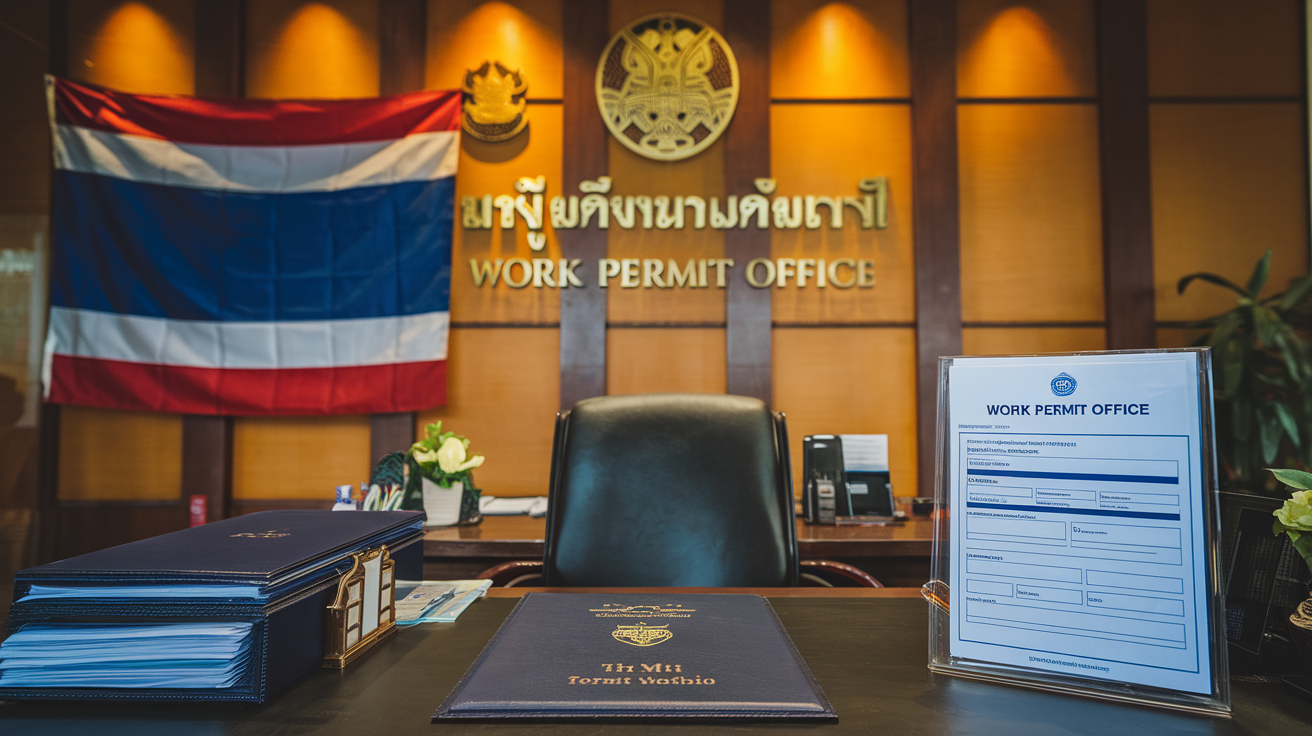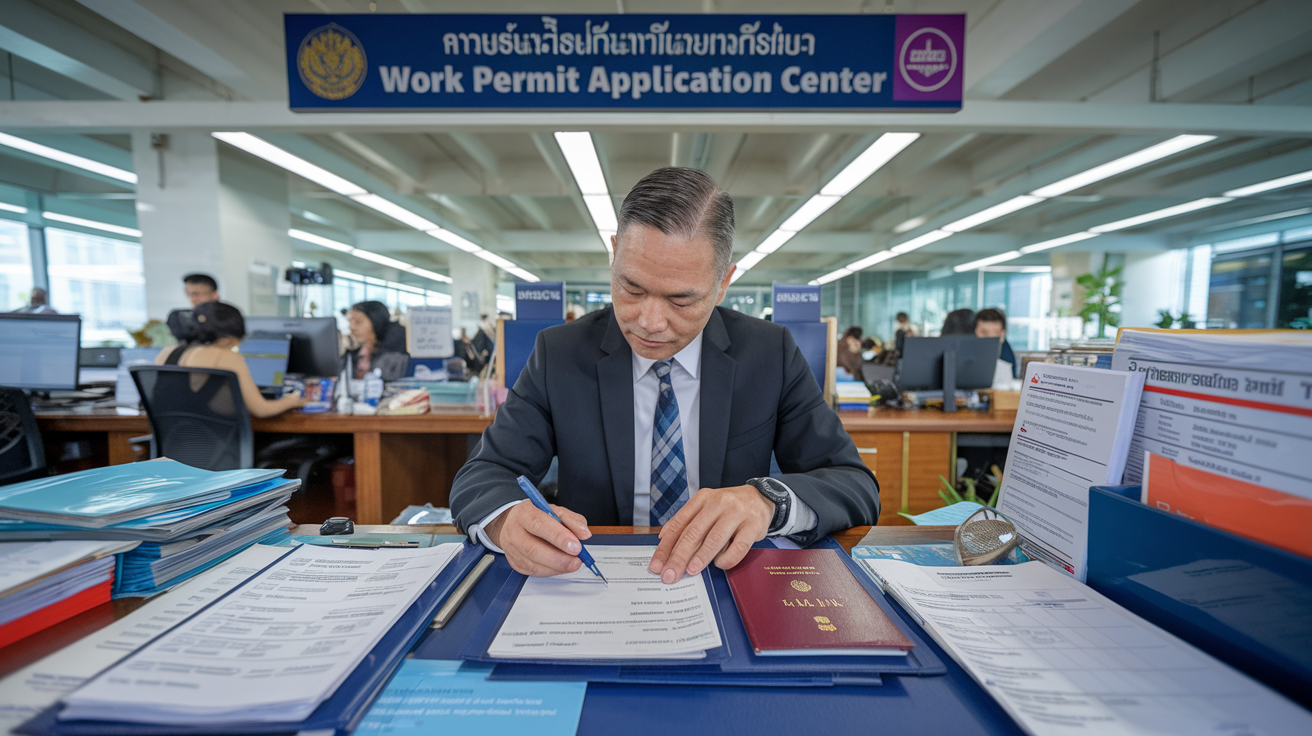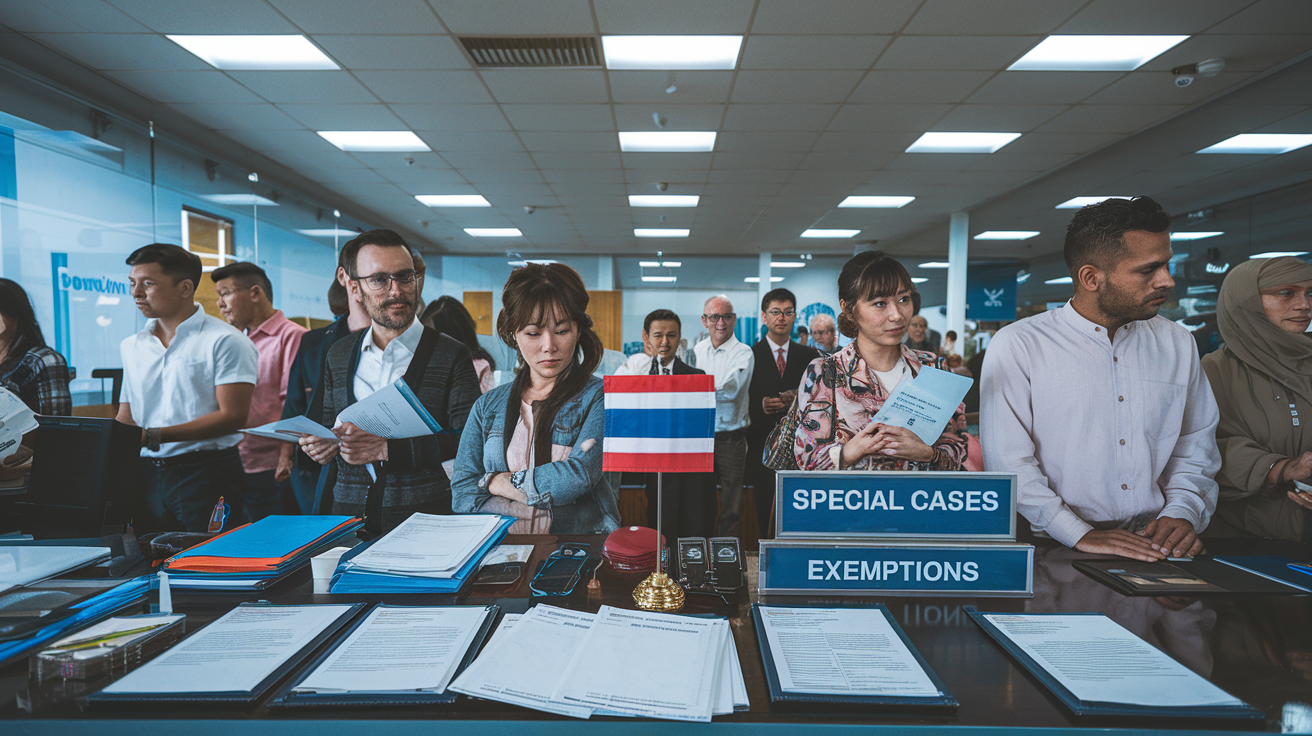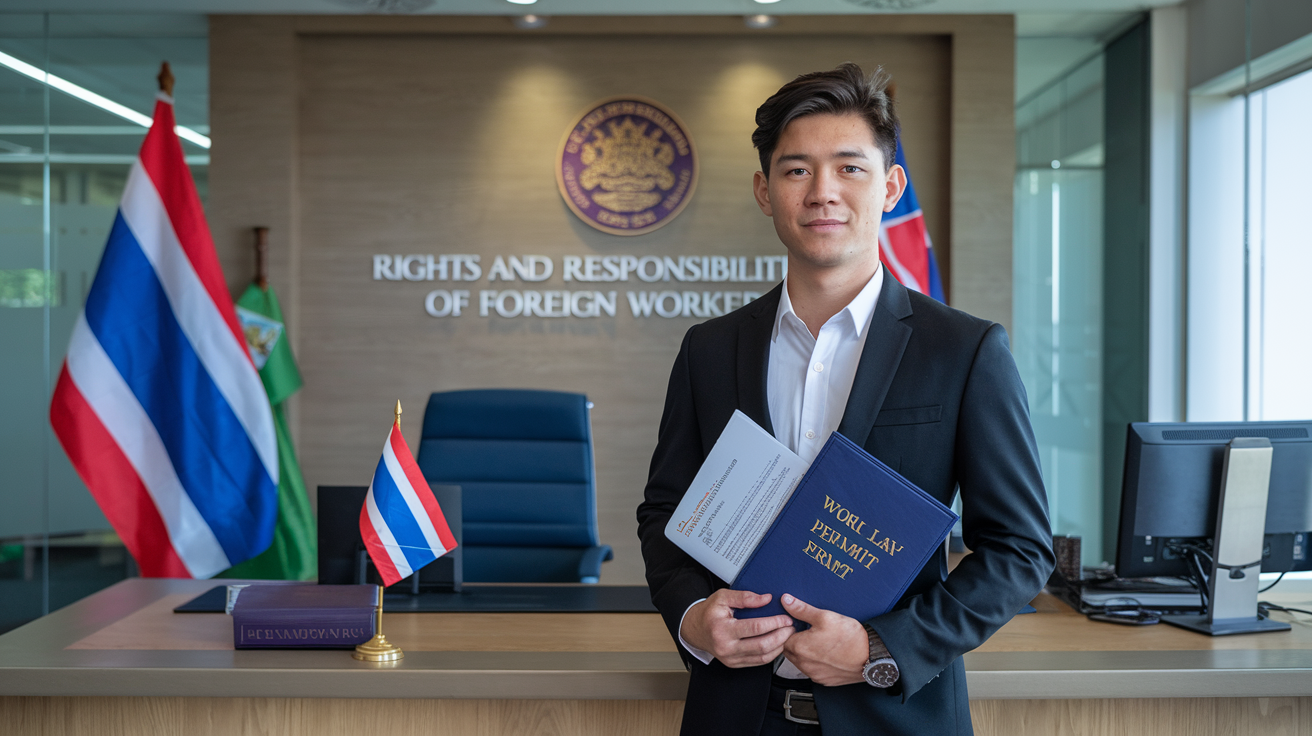Are you dreaming of working in the tropical paradise of Thailand? 🌴 Before you pack your bags and board that plane, there’s one crucial document you need: a Thailand Work Permit. Without it, your dreams of a Thai career could quickly turn into a legal nightmare.
Navigating the complex world of Thai work regulations can be overwhelming. From understanding the requirements to managing the application process, many expats find themselves lost in a sea of bureaucracy. But don’t worry! Whether you’re a digital nomad, an English teacher, or a corporate executive, this guide will be your compass through the intricate maze of Thailand’s work permit system.
In the following sections, we’ll walk you through everything you need to know about obtaining and maintaining a Thailand Work Permit. We’ll cover the essential requirements, guide you through the application process, explain your employer’s role, and highlight the dos and don’ts of keeping your permit valid. Plus, we’ll explore special cases, exemptions, and your rights as a work permit holder. Let’s dive in and unlock your path to legally working in the Land of Smiles! 🔑🇹🇭
Understanding Thailand Work Permit Requirements

A. Eligibility criteria for foreign workers
To obtain a work permit in Thailand, foreign workers must meet specific eligibility criteria:
- Valid non-immigrant visa
- Job offer from a Thai employer
- Qualifications and experience relevant to the job
- Clean criminal record
- Good health condition (medical certificate required)
Foreign workers must also comply with the minimum capital requirements set by the Thai government. The minimum registered capital varies depending on the type of business and the nationality of the foreign worker.
B. Types of work permits available
Thailand offers several types of work permits to cater to different employment situations:
| Work Permit Type | Description | Duration |
|---|---|---|
| Regular Work Permit | Standard permit for full-time employment | Up to 2 years |
| BOI Work Permit | For employees of BOI-promoted companies | Up to 4 years |
| Digital Nomad Visa | For remote workers and freelancers | Up to 10 years |
| SMART Visa | For highly skilled professionals in targeted industries | Up to 4 years |
C. Duration and validity of work permits
The duration of a work permit in Thailand varies depending on the type of permit and the employer’s needs. Generally:
- Regular work permits are valid for up to 2 years
- BOI work permits can be issued for up to 4 years
- SMART visas offer work authorization for up to 4 years
- Digital Nomad visas provide work rights for up to 10 years
It’s important to note that work permits are typically tied to a specific employer and job position. If you change employers or job roles, you may need to apply for a new work permit.
D. Restricted occupations for foreigners
Thailand maintains a list of occupations that are restricted or prohibited for foreign workers. These restrictions are in place to protect job opportunities for Thai citizens. Some of the restricted occupations include:
- Manual labor
- Agriculture, animal husbandry, forestry, or fishery (except specialized work)
- Bricklaying, carpentry, or other construction work
- Wood carving
- Driving motor vehicles (except piloting international aircraft)
- Shop attendance
- Auction organizing and bidding
- Accounting work (except internal auditing)
However, exceptions may apply in certain cases, such as for BOI-promoted companies or highly specialized roles where local talent is unavailable.
Understanding these requirements is crucial for anyone considering working in Thailand. With this knowledge, you can better prepare for the application process and ensure compliance with Thai labor laws. Next, we’ll explore the step-by-step application process for obtaining a Thailand work permit.
Application Process for Thailand Work Permit

A. Required documents and paperwork
To successfully apply for a Thailand Work Permit, you’ll need to gather a comprehensive set of documents. Here’s a list of the essential paperwork:
- Completed work permit application form (WP.1)
- Valid passport with at least 6 months validity
- Non-immigrant visa (usually type B)
- Recent passport-sized photographs (3.5 x 4.5 cm)
- Original and copy of educational certificates
- Letter of employment from your Thai employer
- Company registration documents
- Tax ID card of the company
- Social Security Fund registration (if applicable)
- Map showing the location of your workplace
It’s crucial to ensure all documents are properly prepared and authenticated to avoid delays in the application process.
B. Where to apply: government offices and online options
There are two main ways to submit your work permit application in Thailand:
- In-person at government offices
- Online through the official e-service platform
| Application Method | Pros | Cons |
|---|---|---|
| In-person | Direct assistance, immediate clarification | Time-consuming, may require multiple visits |
| Online | Convenient, time-saving | Limited to certain types of applications |
For in-person applications, you can visit the One Stop Service Center for Visas and Work Permits in Bangkok or the Provincial Employment Office in other provinces. The online option is available through the Department of Employment’s e-service website, though it’s primarily for work permit renewals and some specific cases.
C. Application fees and processing times
The fees for a Thailand Work Permit application vary depending on the duration:
- Up to 3 months: 750 Baht
- Up to 6 months: 1,500 Baht
- Up to 1 year: 3,000 Baht
Processing times can range from a few days to several weeks, depending on the completeness of your application and the current workload of the issuing office. Typically, you can expect:
- 7 working days for standard processing
- 1-3 working days for urgent processing (additional fee may apply)
D. Common mistakes to avoid during application
To ensure a smooth application process, be aware of these common pitfalls:
- Submitting incomplete or inaccurate documentation
- Failing to meet the minimum qualifications for the position
- Applying with the wrong type of visa (e.g., tourist visa instead of non-immigrant B visa)
- Overlooking the requirement for company documents
- Missing the deadline for renewal applications
By carefully preparing your application and double-checking all requirements, you can significantly increase your chances of a successful work permit acquisition.
Now that we’ve covered the application process in detail, let’s explore the crucial role that your employer plays in obtaining a work permit in Thailand.
Employer’s Role in Work Permit Acquisition

Sponsorship requirements
In Thailand, employers play a crucial role in the work permit acquisition process for foreign employees. One of the primary responsibilities of employers is to provide sponsorship for their foreign workers. This sponsorship is essential for obtaining and maintaining a valid work permit in Thailand.
Key sponsorship requirements include:
- Letter of employment or job offer
- Non-immigrant visa support
- Work permit application assistance
- Ongoing compliance with labor laws
Employers must demonstrate their commitment to hiring foreign workers and their ability to provide stable employment. This often involves proving the necessity of hiring a foreigner for the position and showing that no qualified Thai national is available for the role.
Necessary company documentation
To support a foreign employee’s work permit application, employers must prepare and submit various documents. These documents validate the company’s legal status and its eligibility to hire foreign workers.
| Document | Purpose |
|---|---|
| Company registration | Proves the company’s legal existence |
| Tax ID certificate | Verifies the company’s tax status |
| Shareholders’ list | Shows ownership structure |
| Financial statements | Demonstrates financial stability |
| VAT registration (if applicable) | Confirms VAT compliance |
Additionally, employers may need to provide:
- A detailed job description for the foreign employee’s position
- Organizational chart showing the position within the company structure
- Explanatory letter justifying the need for a foreign worker
Minimum capital requirements for hiring foreigners
Thailand has established minimum capital requirements for companies wishing to hire foreign workers. These requirements aim to ensure that businesses have sufficient financial resources to support their foreign employees and contribute to the local economy.
The minimum registered capital requirements vary depending on the number of foreign workers:
- For the first foreign worker: 2 million Thai Baht
- For each additional foreign worker: 1 million Thai Baht per person
It’s important to note that these capital requirements may differ for certain types of businesses or in specific investment promotion zones. For example, companies promoted by the Board of Investment (BOI) may have different capital requirements or exemptions.
Employers must ensure they meet these capital requirements before applying for work permits for their foreign employees. Failure to meet these requirements can result in the rejection of work permit applications or even legal consequences for the company.
In addition to meeting capital requirements, employers should also be aware of the ratio of Thai to foreign employees. Generally, companies are required to employ four Thai nationals for every foreign worker. This ratio helps promote local employment while allowing businesses to benefit from foreign expertise when necessary.
By fulfilling these sponsorship requirements, providing necessary documentation, and meeting capital requirements, employers in Thailand can successfully support their foreign employees in obtaining and maintaining valid work permits. This not only ensures compliance with Thai labor laws but also contributes to a diverse and skilled workforce that can drive business growth and innovation in the country.
Maintaining and Renewing Your Work Permit

Reporting requirements and 90-day check-ins
As a work permit holder in Thailand, it’s crucial to stay compliant with the country’s immigration regulations. One of the most important requirements is the 90-day reporting, also known as the TM47 notification. This process involves informing the Thai Immigration Bureau of your current address every 90 days.
Here’s a breakdown of the 90-day reporting process:
- Timing: Report within 15 days before or 7 days after your 90-day mark
- Methods:
- In-person at an immigration office
- By mail
- Online through the immigration website
| Method | Pros | Cons |
|---|---|---|
| In-person | Immediate confirmation | Time-consuming, potential queues |
| By mail | Convenient | Slower processing time |
| Online | Quick and easy | May experience technical issues |
Remember to keep your receipts or confirmation of reporting, as these may be required for future visa or work permit renewals.
Renewal process and deadlines
Renewing your work permit is a critical aspect of maintaining your legal status to work in Thailand. It’s advisable to start the renewal process at least 30 days before your current permit expires.
The renewal process typically involves:
- Gathering required documents (similar to initial application)
- Submitting the renewal application to the Department of Employment
- Paying the renewal fee
- Attending an interview (if required)
Key points to remember for work permit renewal:
- Ensure your visa is valid throughout the renewal process
- Update any changes in your employment details
- Provide proof of tax payments and social security contributions
Consequences of working without a valid permit
Working in Thailand without a valid work permit or with an expired one can lead to severe consequences. The Thai government takes these violations seriously, and penalties can be harsh.
Potential consequences include:
- Fines: Up to 100,000 THB for the employee and up to 100,000 THB for the employer
- Imprisonment: Up to 5 years for serious offenses
- Deportation: Immediate deportation and potential blacklisting from re-entering Thailand
- Future visa complications: Difficulty obtaining visas or work permits in the future
To avoid these consequences, always ensure your work permit is valid and up-to-date. If you’re changing jobs, remember that your work permit is tied to your employer. You’ll need to cancel your current permit and apply for a new one with your new employer.
Now that you understand the importance of maintaining and renewing your work permit, let’s explore some special cases and exemptions that may apply to certain individuals working in Thailand.
Special Cases and Exemptions

Board of Investment (BOI) promoted companies
The Board of Investment (BOI) in Thailand offers special privileges to companies that contribute significantly to the country’s economic development. These privileges extend to work permit regulations, making it easier for foreign employees to work in BOI-promoted companies.
Key benefits for BOI-promoted companies:
- Streamlined work permit process
- Faster approval times
- Increased quota for foreign employees
- Relaxed educational and work experience requirements
BOI-promoted companies enjoy a more flexible and efficient work permit application process. This expedited procedure allows foreign employees to start working sooner, benefiting both the company and the Thai economy.
| Aspect | Regular Companies | BOI-Promoted Companies |
|---|---|---|
| Processing time | 7-30 days | 3-5 days |
| Foreign employee quota | Limited | Higher quota allowed |
| Educational requirements | Strict | More flexible |
| Validity period | Up to 1 year | Up to 2 years |
Work permit exemptions for specific professions
Thailand recognizes that certain professions require specialized skills or contribute uniquely to the country. As a result, some occupations are exempt from standard work permit requirements.
Professions often exempt from work permit requirements:
- Diplomatic and consular staff
- UN officials and representatives
- Temporary sports coaches
- Foreign arbitrators in trade dispute resolution
- Performers of short-term shows or events
- Conference and seminar speakers
It’s important to note that while these professions may be exempt from work permit requirements, they may still need to obtain the appropriate visa or notify relevant authorities of their activities in Thailand.
Digital nomad and remote worker considerations
As the global workforce evolves, Thailand has begun to address the unique needs of digital nomads and remote workers. While there is currently no specific “digital nomad visa” in Thailand, the country is exploring options to accommodate this growing demographic.
Current options for digital nomads and remote workers:
- Tourist Visa: Suitable for short-term stays, but working is technically not allowed
- Education Visa: For those studying Thai language or other approved courses
- Elite Visa: A long-term option for those willing to invest in a premium visa program
| Visa Type | Duration | Work Permission | Cost |
|---|---|---|---|
| Tourist Visa | Up to 60 days | Not allowed | Low |
| Education Visa | Up to 1 year | Limited | Moderate |
| Elite Visa | 5-20 years | Not included | High |
While these options provide ways for digital nomads to stay in Thailand, they don’t explicitly allow for remote work. It’s crucial for digital nomads to understand the legal implications and potential risks associated with working remotely while in Thailand.
As Thailand recognizes the economic potential of attracting digital nomads, discussions are ongoing about introducing more suitable visa options. These potential changes could include a specific digital nomad visa or modifications to existing visa categories to accommodate remote workers.
Rights and Responsibilities of Work Permit Holders

Permitted activities under your work permit
Once you’ve obtained your Thailand work permit, it’s crucial to understand what activities you’re allowed to perform. Your work permit is specific to your job role and employer, and you must adhere to these limitations:
- Work only for the employer listed on your permit
- Perform only the job duties specified in your permit
- Work only at the location(s) stated in your permit
It’s important to note that engaging in any work activities outside these parameters is illegal and could result in severe consequences, including fines, deportation, or being blacklisted from future work in Thailand.
Here’s a quick reference table of permitted vs. prohibited activities:
| Permitted Activities | Prohibited Activities |
|---|---|
| Work specified in permit | Freelance or side jobs |
| Work for listed employer | Work for other companies |
| Work at approved locations | Work at unauthorized sites |
Taxation and social security obligations
As a work permit holder in Thailand, you’re subject to the country’s tax laws and social security system. Understanding and fulfilling these obligations is crucial to maintain your legal status:
-
Personal Income Tax:
- You must pay income tax on earnings from your Thai employment
- Tax rates are progressive, ranging from 0% to 35%
- File annual tax returns by March 31st of the following year
-
Social Security Contributions:
- Mandatory for most employees working in Thailand
- Both you and your employer contribute 5% of your salary (up to a maximum)
- Provides benefits such as medical care, disability compensation, and retirement pension
-
Withholding Tax:
- Your employer is required to withhold tax from your salary
- Ensures regular tax payments throughout the year
It’s advisable to consult with a Thai tax professional to ensure full compliance with local tax laws and to take advantage of any applicable tax treaties between Thailand and your home country.
Changing employers or job roles
While your work permit is tied to a specific employer and job role, circumstances may arise where you need to make changes. Here’s what you need to know:
-
Changing Employers:
- Inform your current employer of your intention to leave
- Your current employer must cancel your existing work permit
- Your new employer must apply for a new work permit on your behalf
- You may need to leave the country and re-enter on a new visa
-
Changing Job Roles:
- If staying with the same employer but changing your job description, your employer must update your work permit
- This process is generally simpler than changing employers
-
Timeframe Considerations:
- You have 15 days from the cancellation of your old work permit to either leave the country or have a new work permit application submitted
- Failing to adhere to this timeframe can result in overstay penalties
Remember, it’s crucial to follow proper procedures when making any changes to your employment situation to maintain your legal status in Thailand.

Obtaining and maintaining a work permit in Thailand is a crucial step for foreign nationals seeking employment in the country. From understanding the requirements to navigating the application process and staying compliant, it’s essential to be well-informed about every aspect of the Thailand work permit system. Employers play a significant role in this process, and both employees and companies must be aware of their rights and responsibilities.
For those considering working in Thailand, it’s advisable to start the work permit process well in advance of your intended employment start date. Stay informed about any changes in regulations, seek professional advice when needed, and always ensure you’re operating within the legal framework. By doing so, you can enjoy a rewarding professional experience in the Land of Smiles while contributing to its vibrant economy.

